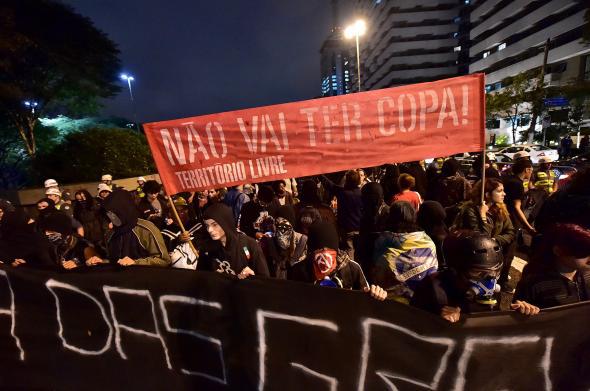World Cups never entirely live up to their hype as transformative political events. The 2010 World Cup in South Africa didn’t quite turn “the tide on centuries of poverty and conflict” as South African President Thabo Mbeki predicted at the time. The improvement in relations between South Korea and Japan around the time of their co-hosting of the 2002 World Cup proved to be short-lived.
All the same, big events like the World Cup—despite typical concerns about costs, security, and corruption—are generally at least met by optimism and national pride in the host country. So the latest indications about the national mood in Brazil are striking.
A new Pew Poll finds that 61 percent of Brazilians feel that hosting the World Cup is a “bad thing because it takes money away from public services” vs. just 34 percent who think it’s a “good thing because it creates jobs.” Thirty-nine percent say it will hurt Brazil’s international image, while only 35 percent think it will help.
The poll comes after protests in May that brought as many as 10,000 people into the streets to protest World Cup costs. Hundreds of protesters, including indigenous groups, were met with riot police and tear gas when they attempted to march to the National Stadium in Brasilia last week.
Obviously, this isn’t just about soccer. Brazil’s once-booming economy has ground to a halt over the last three years, and there’s widespread public anger over inflation and government corruption.
The same Pew poll found that 72 percent are generally dissatisfied with things in Brazil today, and a narrow majority give a negative rating to President Dilma Rousseff, compared with the sky-high popularity enjoyed by her predecessor Luiz Inácio Lula da Silva throughout his tenure. With elections approaching in October, the only good news for Rousseff is that Brazilians seem to like her potential opponents even less.
With protests, construction delays, and a crime wave in Rio in the headlines, the 2014 World Cup is starting on a decidedly downbeat note. Some of this is to be expected. Mega-events like the World Cup and the Olympics invariably get bad press in the days before they begin when the host is scrambling to make last-minute preparations and the media doesn’t yet have any sports to cover. (In the case of British tabloids, this coverage is often tinged with a healthy dose of xenophobia.)
But the bigger concern may that the mood is so dour in Brazil today that the most soccer-mad population on Earth is ambivalent bordering on hostile about hosting the game’s biggest event. In 2007, FIFA awarded the cup to a booming economic powerhouse confident about its rising global status. It seems to be holding the event in a much different place.
